Critics are raining fire upon a major Canadian pipeline company they believe is making it difficult for French-Canadians to get information about a controversial energy project that could run directly through their backyards.
TransCanada Corp., the Calgary-based energy giant proposing to build the 4,500 kilometre cross-country Energy East pipeline, has already run into trouble with language rights and environmental groups for submitting its 38,885-page application to the National Energy Board (NEB) in English in May 2016 without making a French version available until June 15. The company's tardiness, they argued, meant francophones would have less time to study the documents and prepare for federal pipeline hearings that began in August.
Though TransCanada now has the full application available in French on its website, the platform doesn't actually allow users to search for important text by topic using keywords, prompting further criticism from concerned French-Canadians. The online oversight means that if a resident is looking for specific information about their neighbourhood, for example, they may have to go through all 38,885 pages to find answers.
These language concerns add to what is already considered to be a controversial project in Quebec, a part of the country where opposition to the fossil fuel industry appears to be strongest along Energy East's proposed pipeline route.
“This is slightly backwards to be honest,” said Karine Péloffy, executive director of the Montreal-based Quebec Environmental Law Centre. "The issue with the website is just one example demonstrating the different treatment reserved to the two language communities when it comes to access to information."
Her organization and four landowners along the pipeline route have already launched one lawsuit against the NEB over its failure to provide a French version of TransCanada's application at the same time as the English version.

No keyword searches by topic
The Energy East pipeline is a $15.7-billion proposal that, if approved, would carry up to 1.1 million barrels of oil per day from the Prairies through Quebec and into New Brunswick for overseas shipping. It would cross regions where millions of francophones live and is currently undergoing NEB hearings in New Brunswick.
Oil producers and the business community believe the pipeline holds the key to jobs and growth in a sector that has been hammered by slumping global commodity prices, while environmentalists, First Nations leaders and some local mayors have fiercely opposed the project, warning it could lead to spills and prevent Canada from doing its fair share to fight climate change.
Efforts to slow down those hearings through the courts because of delays in translation have already failed, and while the vast majority of those details are now available on the company’s French website, the keyword search problem on the website adds an additional problem, preventing francophones from locating information sorted in detail by topic in the same way they could if they searched in English via the NEB.
Results for the word ‘crude oil,’ for example, on the NEB website turn up more than 300 detailed results within TransCanada documents, while searches for the equivalent in French turn up far fewer hits, with a search constrained to document titles only.
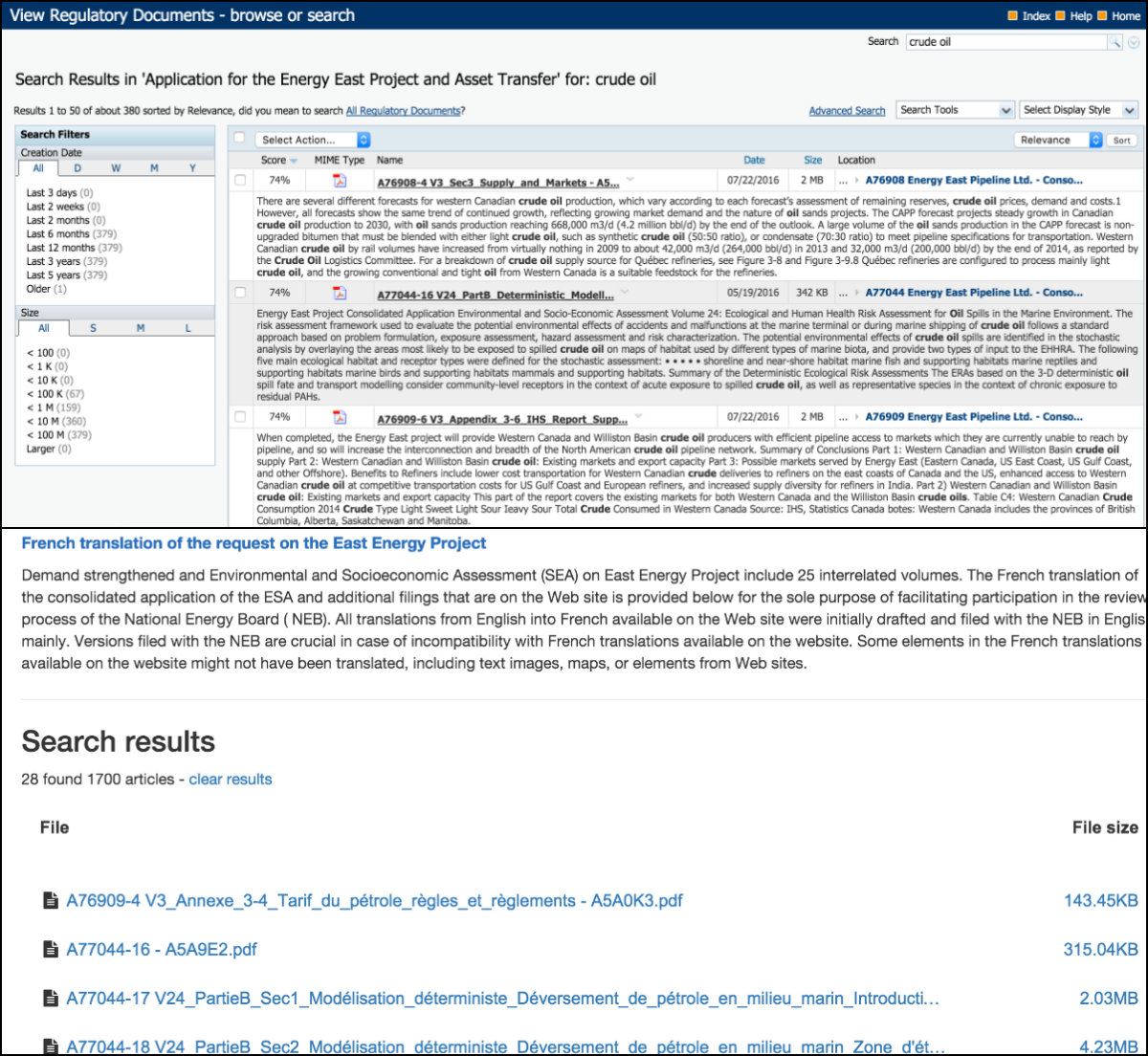
TransCanada working to fix the “double standard”
According to TransCanada spokesperson Tim Duboyce, no one has complained about the keyword search issue to date, but the problem has been on the company’s radar for quite some time. Its staff are working diligently on the computing problem and could have a solution within “days possibly.”
“What we set out to do with the French language version was really to mirror exactly what was on the NEB site, including the categorization, the indexing and labeling of each of the sections,” he told National Observer. “It’s something they’ve been working on for a while as part of an ongoing effort to ensure the functionality of the page.
“It’s a 38,000-page document that’s in there.”
Regardless of the number of pages however, Steven Guilbeault, spokesperson for the Montreal-based social justice nonprofit, Équiterre, said the pattern of discrimination is “appalling.”
"Clearly, it shows that there’s a double standard,” he said, “and for a project that goes through a province where the majority of people are francophone…it does put a lot of people at a disadvantage."
Péloffy, from the environmental law centre, also said she will mention the search box issue in her upcoming affidavit in the lawsuit against the NEB, and that unequal access to official federal filings is a major problem.
No comment from official languages commissioner
The NEB declined to answer National Observer's questions about this story, and instead issued a statement emphasizing the importance of interpreters at NEB panel sessions and hearings, the availability of Energy East documents in French online, and the seriousness with which it takes its obligations under the Official Languages Act.
It also noted in its statement that TransCanada has the right to submit its application in the official language of its choice.
The office of the federal commissioner of official languages said it could not comment until it had received a complaint on the keyword search issue, though the commissioner himself has previously gone on the record regarding TransCanada’s translation problem:
"We have done an investigation and our investigations are confidential,” said Graham Fraser at an Ottawa press conference in May. “But I think it’s fair to say that I believe very strongly that citizens need to have access to critical information that affects where they live in the official language of their choice.”
The translation issue was condemned at the time by the Fédération des communautés francophones et acadienne (FCFA) as “not acceptable,” but the national French community group did not respond to requests for comment on this story before the publication deadline.
Official Languages Commissioner Graham Fraser speaks about complaints received regarding English-only TransCanada documents at a press conference in Ottawa, May 2016. Video by Mike De Souza.
French language woes plague Kinder Morgan consultations
On the other side of the country, the lack of French translation services at public pipeline consultations continue to pour salt on the wounds of Francophones hoping to weigh in on major energy projects awaiting approval in their own backyards.
During a federal government feedback session on the controversial Kinder Morgan Trans Mountain expansion near Vancouver last week, National Observer learned that no formal translation service would be provided for French-speaking presenters, and the presence of bilingual Natural Resource Canada staff with translation abilities was not made known to the public.
“The panelists put their pens down and just stared off into space,” said Dogwood Initiative’s Kai Nagata, a native English speaker who presented in French last Thursday just to find out how truly accessible the process was to all Canadians.
“I wanted to test whether the government actually had any means of accepting evidence in Canada’s other official language, and I think what it showed what that regardless of what language you speak, it doesn’t really matter. They’re not recording anyone’s evidence neither French nor English and there’s no public record to speak of.”
A spokeswoman from Natural Resources Canada, Danica Vaillancourt, said all official documents published as a result of the consultations will be made available both in French and English, but the ministry’s panelists confirmed they were not recording the meetings and were relying on their own hand-written notes, and the contributions of a few extra note-takers.
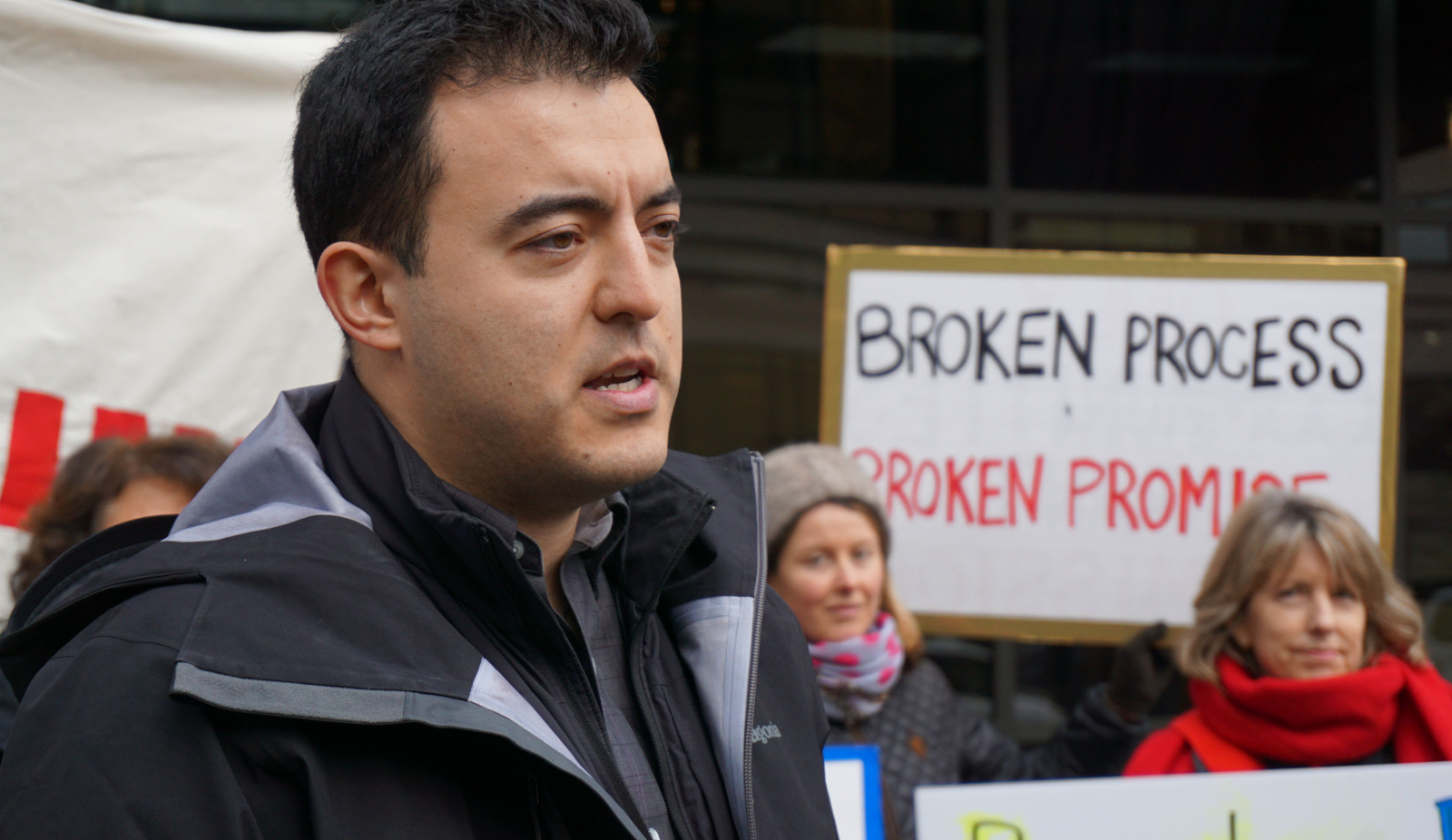
Dogwood Initiative's communications director, Kai Nagata, pipes up against the Kinder Morgan Trans Mountain expansion during the National Energy Board's hearings on the pipeline in Burnaby, B.C. on Jan. 19, 2016. Photo by Elizabeth McSheffrey
B.C. francophones upset with federal "oversight"
More than 45,000 francophones live near the pipeline route in Vancouver’s Lower Mainland alone, and while Natural Resources Canada reported that no francophones had attempted to speak at consultations to date, francophone groups across B.C. were still ticked off by the lack of options.
“I probably will have to refer that to the commissioner on official languages and send him a complaint saying listen, ‘It’s a federally run consultation and there’s absolutely nothing provided for francophones,” said Christian Deron, government relations co-ordinator for La Fédération des francophones de la Colombie-Britannique (FFCB).
“I must be sounding blasé but there are so many other occurrences of that situation. It’s not pleasing but it’s not surprising.”
Pierre Rivard, director of Le Centre culturel francophone de Vancouver, called it an “unfortunate oversight,” and Johanne Dumas, director of La Société francophone de Maillardville said it was “just another way of ignoring that there is linguistic duality in this country.”
The Trans Mountain expansion is a proposal from a Texas-based oil giant to add 980 kilometres of pipeline to a system that already transports 300,000 barrels of oil per day to refineries and terminals near Vancouver and Washington. The $6.8-billion addition would triple the system’s capacity, and, like Energy East, is backed by the oil industry. The Trans Mountain expansion project also faces fierce opposition from at least 17 First Nations and 21 municipalities.
While the federal government is not legally obligated under the Official Languages Act to provide translation services at a consultation, Nagata said the lack of French accessibility smears further doubt onto a consultation process designed to restore public trust in the energy project review process after years of scandal within the NEB.

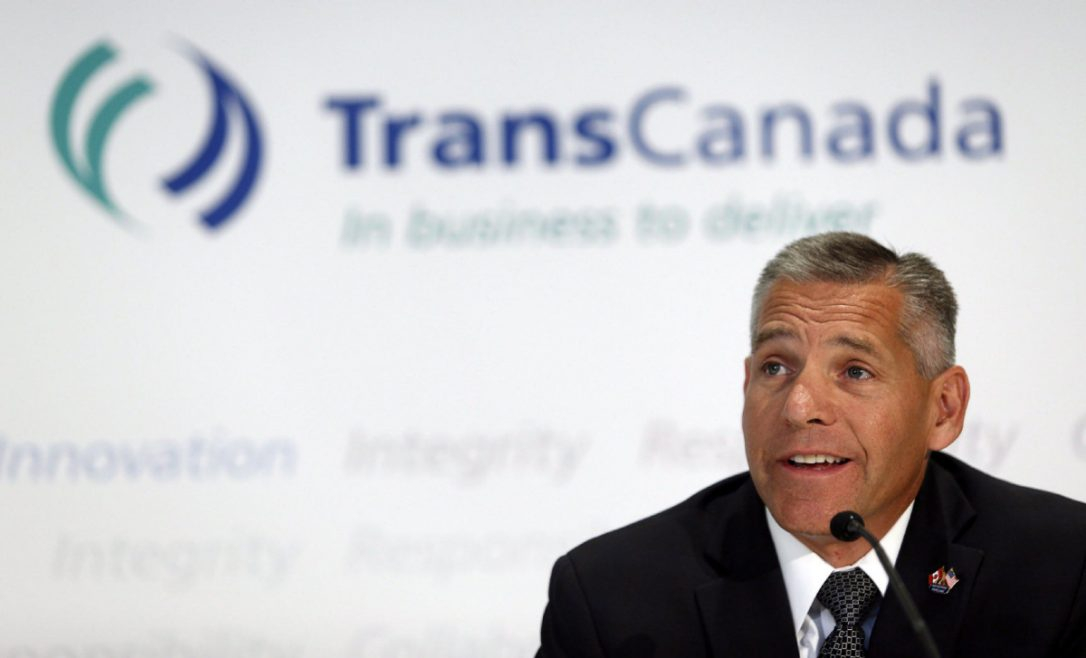

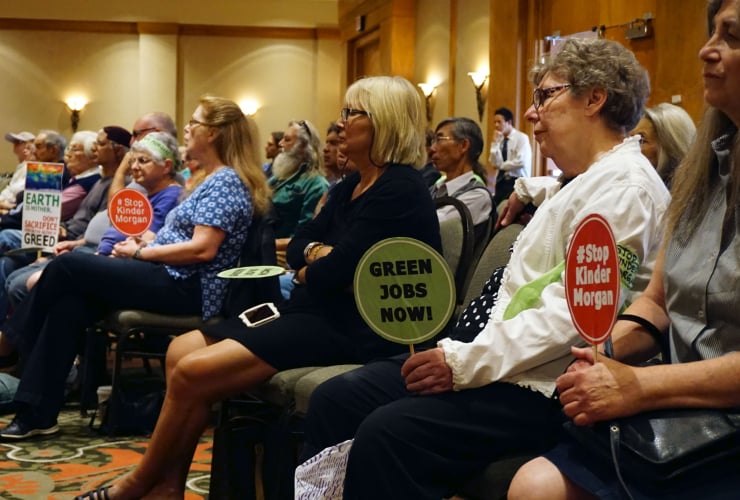
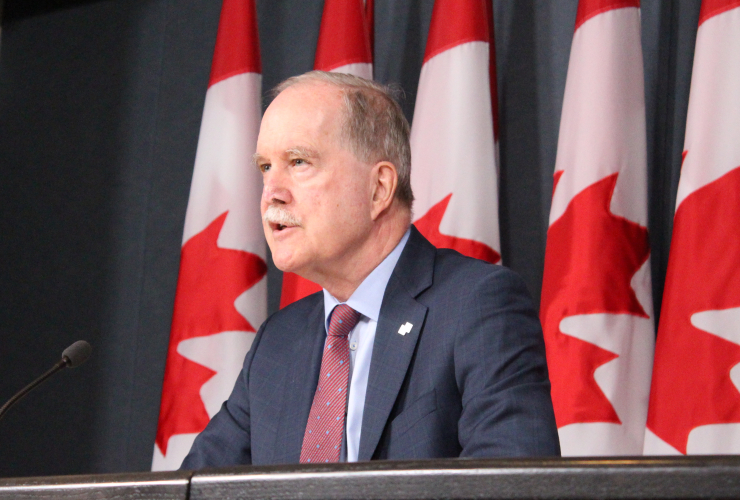

Comments